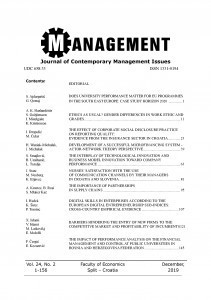This research focuses on female work ethics in Iceland, one of the most gender equal countries in the world. The Multidimensional Work Ethic Profile (MWEP) was used for measuring the work ethic of 238 students of both genders. Based on a convenience sample obtained from the School of Business, University of Iceland we tested two hypotheses. The first concerned whether women have a higher work ethic than men; the second whether female students have higher grades than their male counterparts. We found women to have both a higher work ethic and grades than men. Overall outcomes based on the MWEP revealed statistically significant differences between the averages of women and men, with the mean for women higher by 7.07 points. In addition, women’s average university grades were found to be statistically higher than those of men by a margin of 0.36 points. These results provide interesting insights into the potential contribution of women and men to the workplace, suggesting that women, on average, will be more productive and deliver superior performance. Furthermore, work-based research and evaluations are necessary to test this inference, including the research across different sectors of the Icelandic economy.; Ovaj se rad bavi radnom etikom žena na Islandu, jednoj od država s najvišom razinom spolne ravnopravnosti na svijetu. U radu se koristi multidimenzionalni profil radne etike za mjerenje radne etike 238 studenata obaju spolova. Na temelju prigodnog uzorka studenata poslovne škole Sveučilišta u Islandu, testirane su dvije hipoteze. Prva se odnosila na veći stupanj radne etike, a druga na veću razinu ocjena žena u odnosu na muškarce. Obje su hipoteze potvrđene, s obzirom da je, korištenjem multidimenzionalnog profila radne etike, dobivena statistički značajna razlika između prosjeka žena i muškaraca, pri čemu je prosjek žena bio veći za 7.07 bodova. Nadalje, prosječne ocjene studija žena su bile statistički značajno veće od ocjena muškaraca za iznos 0.36 jedinica ocjene. Dobiveni rezultati nude zanimljiv uvid u potencijalni radni doprinos žena i muškaraca, pri čemu se pokazuje da bi žene, u prosjeku, mogle biti produktivnije. Nadalje je potrebno istraživanje utemeljeno na praksi, kako bi se testirala postavljena tvrdnja, uključujući i istraživanja kroz različite sektore islandskog gospodarstva.
Sažetak

 Management : journal of contemporary management issues : 24,2(2019) / editor-in-chief Nikša Alfirević.
Management : journal of contemporary management issues : 24,2(2019) / editor-in-chief Nikša Alfirević.